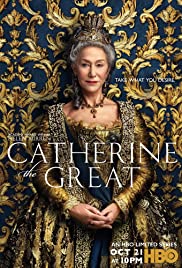
CATHERINE THE GREAT
UK, 2019, 200 minutes, Colour.
Helen Mirren, Jason Clarke, Gina Mc Kee, Richard Roxburgh, Joseph Quinn, Clive Russell, Kevin Mc Nally, Rory Kinnear, Georgina Beedle, Thomas Doherty.
Directed by Philip Martin.
This is a British miniseries quite lavish in production, filmed in Lithuania and on location, capitalising on Russian buildings, palaces, exteriors and interiors, period costumes and decor.
It does not give specific dates but begins in the early part of the 18th century and there is a reference to the French Revolution and the death of Louis XVI by the end, bringing the action into the 1790s.
While Helen Mirren is a powerful screen presence, she was performing in her early 70s, impersonating a much younger woman which tests credibility despite her skills. She had played Queen Elizabeth I, Queen Elizabeth II and a number of regal characters.
Audiences may find some difficulties with other members of the cast, the impact of Jason Clarke as Potemkin, also with his being young, ageing. Richard Roxburgh has a strange accent as the younger Orlov the brother, while Kevin Mc Nally is the older. Rafe Spall is much more successful and consistent as Minister Panin.
The themes are interesting, Catherine herself becoming empress after the death of her husband, with the support of the Orlov brothers, alienated from her son but trying to reconcile with him, finding that he is too weak for her convictions. She is portrayed as having a lust for power as well as a lust for lust, her many liaisons, and her final and long relationship with Potemkin.
The screenplay seems to have parallels between contemporary Russia and Russia in the 18th century, becoming great, progressive, suspicions of relationships with Europe, more interested in expansion to the east and south, especially with Crimea and a port on the Black Sea. And, there is a traditional antagonism with the Turks.
There have been a number of portraits of Catherine the Great on screen, from Elizabeth Berger in the 1930s, Marlene Dietrich as The Scarlet Empress, Tallulah Bankhead as Czarina in the 1940s and Jeanne Moreau as Great Catherine in the late 1960s.
1. Revisiting Russia in the 18th century, the reign of Catherine the Great, her personality and rule, her relationships, politics, Russia with Europe, Russia with the East, the Turks, Crimea?
2. The recreation of the period, buildings and décor, interiors, the splendour? Costumes and decor? The action sequences? The visits to the Black Sea? The musical score?
3. Made for television, the episodes, the cumulative effect? The presence of Helen Mirren? The rest of the cast? The modern perspectives? Language and expression?
4. The parallels with 21st-century Russia, Russia being great, relationship with Europe and tensions, the Soviet empire and collapse, the outreach to the countries of the Empire? The parallels with Vladimir Putin?
5. The portrait of Catherine, Helen Mirren and her age, playing the part of the younger Catherine? Credibility? Her background, from Germany at 15, learning Russian, her marriage, her son and his being taken by her mother-in-law, the strained relationship with her son, her weak husband, the Orlovs and taking the throne, his death, the cousin and his madness, death in prison? Her becoming empress?
6. Catherine and her manner, her relationships with men, with Orlov, not marrying him, his womanising, the clash between them, his brother and his power, their role in deposing the Emperor, the dislike of Potemkin, bashing him? Falling from power, the older brother’s return?
7. The arrival of Potemkin, age and experience, the attraction towards Catherine, the encounter with the Countess, the liaison, her encouraging him with the Empress? His liaisons with women, the attraction to the Empress? Her attraction? Seeking him out, his return to the court, his mimicking her speech to the people? His being accepted? A man of action, the fight against the Turks, his achievement? The return, power, his idea about Crimea? Her hesitations? The passionate relationship? The Orlov brothers and their bashing him? His restlessness, the tension in the relationship? His negotiation with the Tartars, peace, there pledging loyalty, the building of Sebastopol, the port in the Black Sea and Russia’s
greatness? His return, Minister for war, foreign affairs, the siege of the Turkish town? The spies? His letters to Catherine? His death and its impact on her?
8. The Orlov brothers, their power, Catherine’s attitude? Relationships? Falling from power?
9. The Countess, her friendship with Catherine, advice, with Potemkin, her presence through the years?
10. Minister Panin, his continued presence, advice, his relationship with Paul, encouraging him? Catherine dominating him, his policies, over the years, her demanding his resignation?
11. Paul, brought up by his grandmother, angry with his mother, the death of his father, suspicions? The discussions with Panin, his ambition to be Emperor? The marriage, his wife and her affairs, pregnancy, her death and the death of the baby? The impact on him? On Catherine? His sulking, his mother making demands, his marriage to the German Princess? The birth of the son? Catherine has the doting grandmother? Wanting to bring him up, getting him to sign the document of succession? Paul and the foreign troops, his mother sending him to Austria as ambassador? Her death and his reaction to the documents, becoming Emperor?
12. The years passing, Catherine getting older, her liaison with young men at the court? The effect on her, on them?
13. Catherine’s collapse, crowding around her, her death?
14. The portrait of the Empress, her social concern, speech to the Russians, antislavery, her writings? Politics? Her lust for power, her lust for last? Her impact on history?